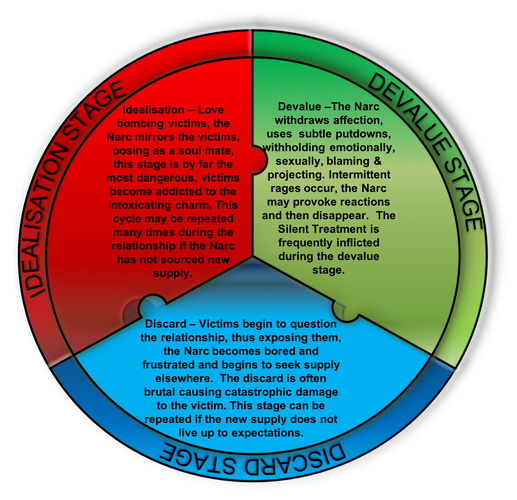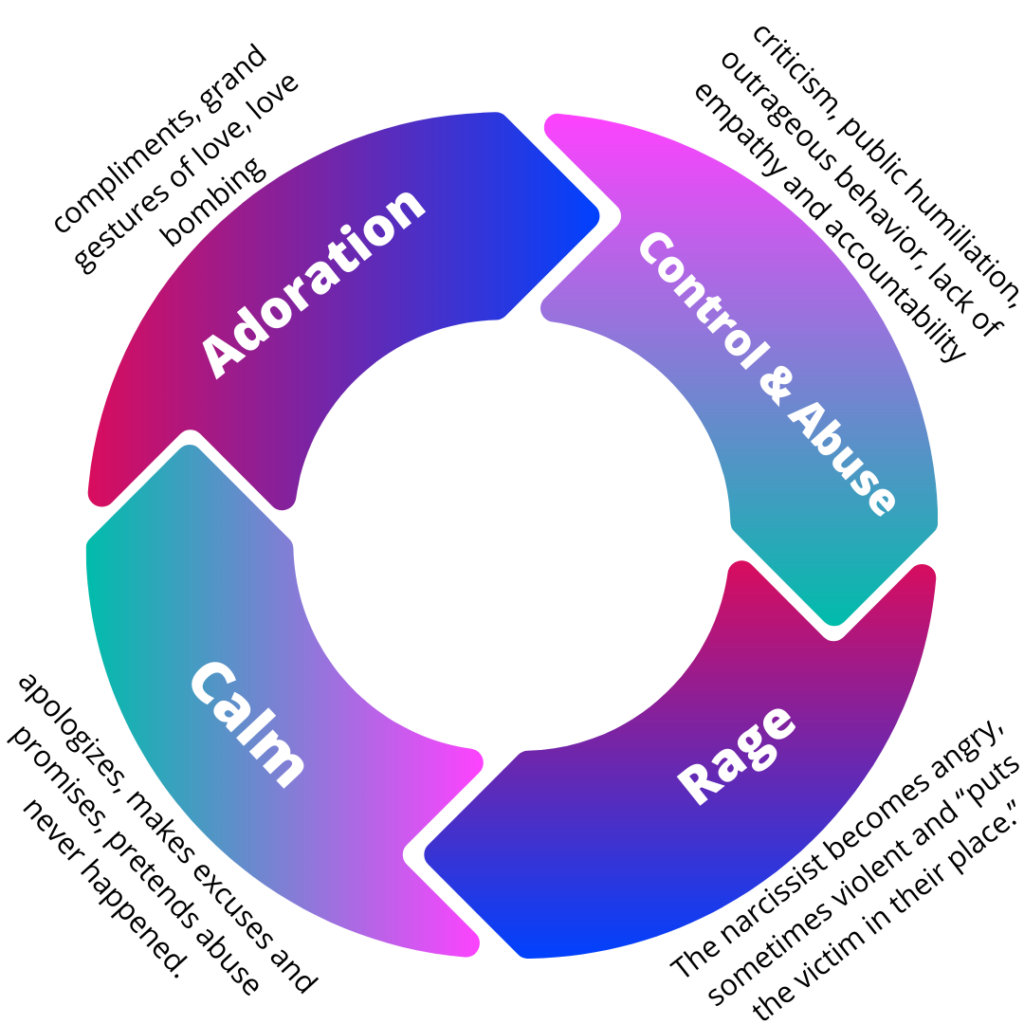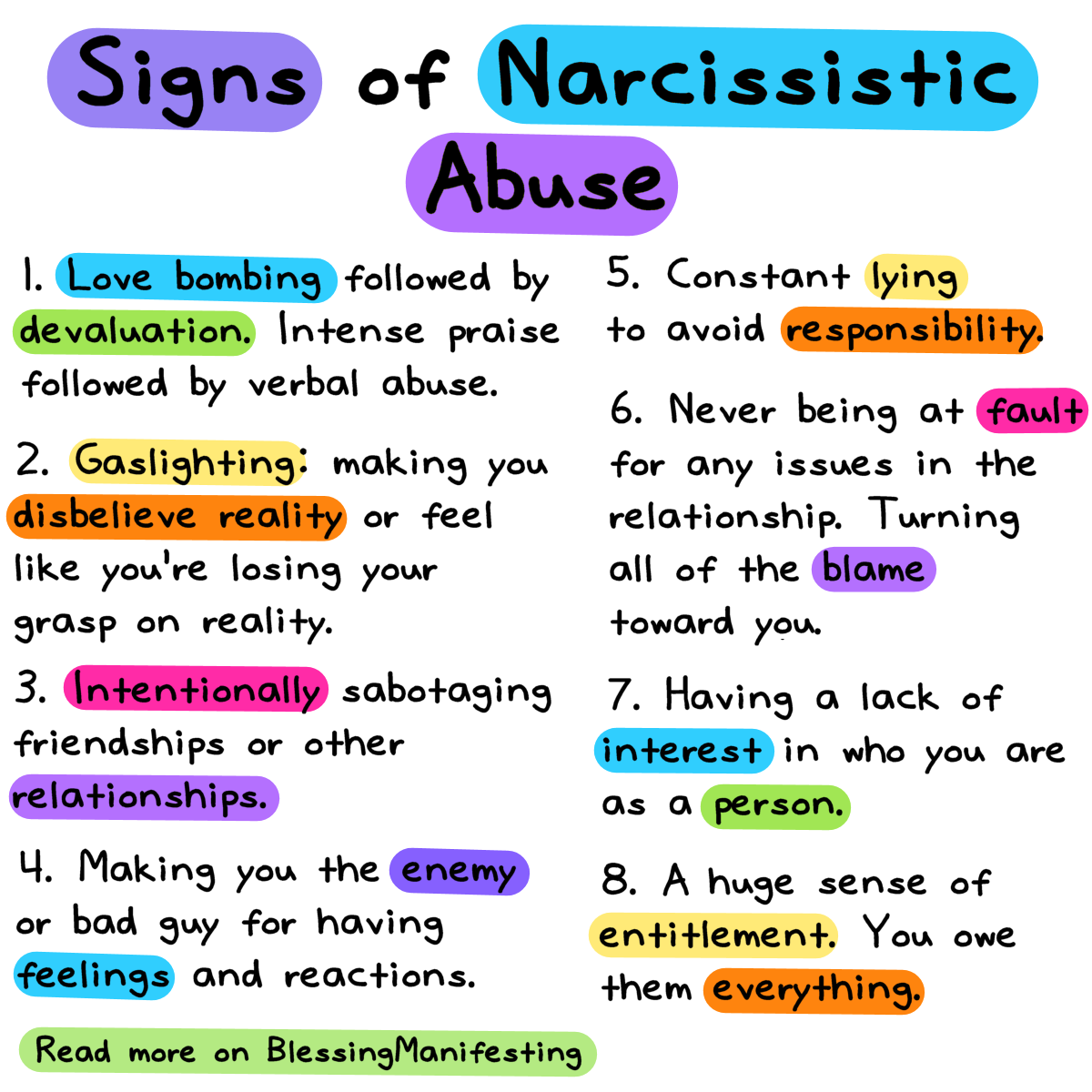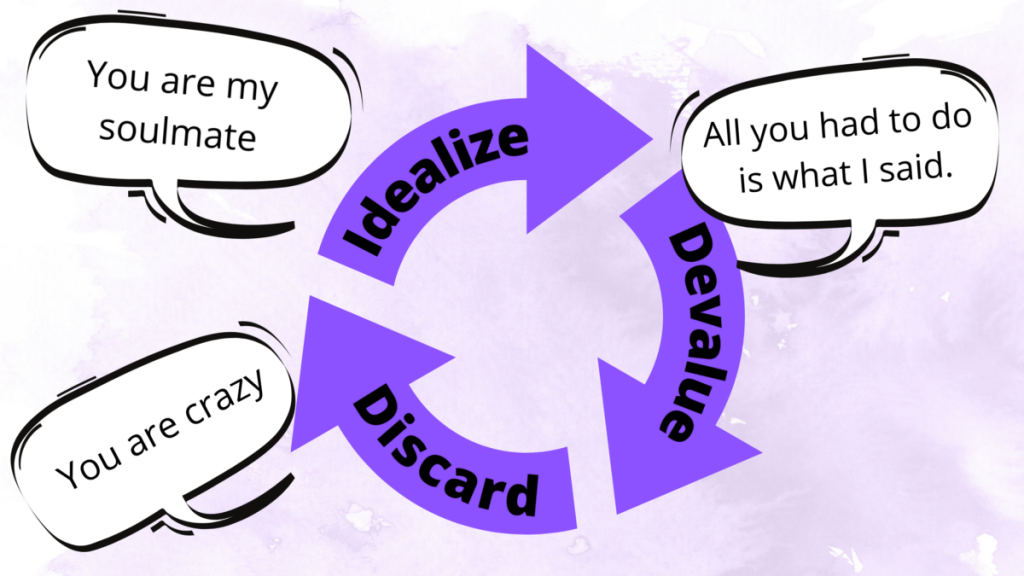If you are in a relationship with someone who is narcissistic, then you may be wondering if there is any way to make it better. Unfortunately, the narcissistic abuse cycle is very difficult to break free from. In this blog post, we will discuss the different stages of the cycle, as well as some signs that you may be in an abusive relationship. We will also provide some self-help tips and talking points for those considering professional help.
Contents
Understanding Narcissistic Abuse Cycle

The narcissistic abuse cycle is a pattern of behavior that often occurs in relationships with someone who is narcissistic. The stages of the cycle are:
Idealization
In the idealization stage, the narcissist puts their partner on a pedestal and showers them with compliments and admiration. They may seem like the perfect partner, and it can be difficult to believe that they could be anything other than perfect.
Example: “You are so beautiful.”
Devaluation
After a while, the narcissist will start to show their true colors. The narcissist may make fun of their partner or call them names. They may also withdraw compliments and admiration. They may criticize or belittle you in an attempt to make themselves feel better about themselves. This is often done behind closed doors and can be very subtle at first, but over time it becomes more obvious.
Example: “You are so stupid. Why did I ever marry you?”
Discard
In the Discard phase, the narcissist moves on to another relationship and leaves their partner behind without any warning or explanation. They will often claim that they were never interested in anything serious with their former partner and that it was just a fling or something along those lines. It leaves their partner feeling shocked and confused.
Example: “I met someone else, so I can’t see you anymore.”
History and Development
The history of the narcissistic abuse cycle dates back to ancient Greek mythology when the goddess Echo was punished by Zeus for helping his wife Hera catch him cheating on her with other women.
The punishment consisted of Echo being cursed so that she could only repeat the last words of others. This is thought to be the origin of the phrase “echo chamber.”
Fast-forward a few thousand years, and we see narcissistic abuse cycles happening in all sorts of relationships – not just romantic ones. Friends, family members, and co-workers can all be victims of a narcissist’s manipulation tactics.
Identifying Narcissistic Abuse Cycle

There are some signs that can help you identify if you or someone else is in an abusive relationship with a narcissist. Here are the top five most commonly observed behaviors:
Gaslighting
This is when your partner makes you believe things that aren’t true, such as accusing you of cheating on them when it never happened.
Example: “You must be cheating on me because you haven’t been answering my calls.”
Projection
This is when a narcissist projects their own flaws onto someone else, such as accusing them of being a liar when they know deep down that it’s not true.
Example: “I can’t believe you would lie to me like that.”
Smear campaign
This is when your partner tries to damage your reputation by spreading rumors about you in an effort to make themselves look better.
Example: “She’s a bitch who doesn’t deserve any respect from anyone.”
Isolation
This is when your partner tries to isolate you from other people and make you feel like there are no options available but staying with them.
Example: “I don’t want you going out with any of those other guys because they might try something.”
Triangulation
This is when your partner tries to make you feel like there’s something wrong with them. So that they can manipulate others into believing their lies.
Example: “I know what he did was bad, but I’m sure it wasn’t his fault.”
Hoovering
This is when your partner tries to get you back after they’ve already abandoned or broken up with you.
Example: “I’m sorry for everything I did, and I know we can work it out if we just try a little harder next time.”
Blackmail
This is when your partner threatens to expose something private about you in order to get their way.
Example: “If you don’t give me money right now, then I’ll tell everyone at work that we’ve been sleeping together.”
Abuse
This is when your partner physically or emotionally abuses you in any way.
Example: “I’m going to hit you so hard that you won’t be able to sit down for a week.”
Dangers of Narcissistic Abuse Cycle

When a narcissist abuses someone, they may use physical or emotional violence to get their way. Some of the most common forms include:
- Physical Abuse: This is when your partner physically harms you in any way, such as hitting you or throwing objects at you.
- Emotional Abuse: This is when your partner tries to manipulate and control you through intimidation, guilt-tripping, or other forms of emotional blackmail.
- Sexual Abuse: This is when your partner forces you to have sex with them against your will.
- Psychological Abuse: This is when your partner tries to make you feel like there’s something wrong with you by calling names and putting them down on a regular basis.
Ill-effects of Narcissistic Abuse Cycle
Living in an abusive relationship with a narcissist can take a toll on your mental and emotional health. Some of the most common symptoms include:
- Depression: This is when you feel sad, hopeless, and helpless for extended periods of time.
- Anxiety: This is when you experience excessive worry or fear about everyday situations.
- Post-Traumatic Stress Disorder: This is when you re-experience the traumatic event through flashbacks and nightmares.
- Suicidal thoughts or behavior: This is when you feel like ending your life because it seems hopeless to go on living in an abusive relationship with a narcissist.
NOTE: If you’re in an abusive relationship with a narcissist, it’s important to remember that it is not your fault. You are not responsible for the abuse that is happening to you.
It’s also important to know that the abuse is not going to stop on its own. The only way to end the cycle of narcissistic abuse is by getting out of the relationship and seeking help from a qualified mental health professional.
Overcoming Narcissistic Abuse Cycle
There is no one-size-fits-all approach to overcoming narcissistic abuse, but there are a few things that can help you start the healing process. Such as:
- Support Groups: These are groups of people who have been through similar experiences and can share their knowledge with you.
- Therapy: This is a safe place where you can talk about your experiences and begin to heal the emotional damage that has been done.
Self-help Tips For Narcissistic Abuse Cycle
If you’re currently in an abusive relationship with a narcissist, there are some things that you can do to help yourself.
Don’t Isolate Yourself: This will only make you feel more alone and isolated.
Talk to Someone You Trust: This could be a friend, family member, therapist, or someone else who can help you feel less alone.
Get Support: This is when you talk to a professional who has experience dealing with victims of abuse and trauma.
Set Boundaries: This is when you make a list of things that are acceptable to you in relationships and those which aren’t.
Practice Self-Care: This means taking care of your physical, emotional, mental, and spiritual needs so that they don’t get neglected by the abuse.
Educate Yourself About Narcissistic Abuse: The more you know about narcissistic personality disorder (NPD), the better equipped you will be to recognize it in others and yourself.
Talking To a Professional
You are not alone in this! There are many people who have been through similar experiences and can help you on your journey towards healing.
The first step is to talk with a trusted friend or family member about what’s going on in your life right now. They will be able to provide support during this difficult time as well as realistic expectations for what lies ahead.
It’s also important to talk with a professional therapist about your experiences so that you can get the help you need. A good therapist will be able to listen without judgment and give you tools for coping with this difficult situation at hand.
Check here to find best Online Abuse Therapist
Therapies For Narcissistic Abuse Cycle
There are several different types of therapies that can be used to help you overcome narcissistic abuse. The type of therapy will depend on what your goals are for treatment and how much time you have available.
Psychotherapy: This is when a therapist helps you understand the root cause of your issues so that they can work towards treating them at their source instead of just dealing with the symptoms.
Cognitive Behavioral Therapy: This is a type of therapy that helps you identify and change the thoughts and behaviors that are causing you problems in your life.
Dialectical Behavior Therapy: This is a type of therapy that helps you learn how to regulate your emotions, tolerate distress, and effectively communicate with others.
Eye Movement Desensitization and Reprocessing: This is a relatively new therapy that helps you process traumatic memories so that they no longer have such a negative impact on your life.
Experts’ Opinion About Narcissistic Abuse Cycle
“The first step in overcoming narcissistic abuse is to talk with a trusted friend or family member about what’s going on in your life right now.” — Dr. John M. Grohol, PsyD
“The type of therapy you choose will depend on what your goals are for treatment and how much time you have available.” — Jonice Webb PhD
Case Study
Alice is a 34-year-old woman who has been in a relationship with her narcissistic partner for the past two years. She came to therapy because she was feeling overwhelmed and exhausted by the abuse that she was experiencing in her relationship.
Through therapy, Alice was able to understand that her partner was a narcissist and that their relationship was toxic. She learned how to set boundaries and communicate more effectively with her partner so that he would stop abusing her verbally, emotionally, financially, and physically.
Movies And Books About Narcissistic Abuse Cycle
If you are looking for more information about narcissistic abuse, there are several movies and books that can help.
Movies
- Gaslight
- The Silent Treatment
Books
- Narcissism: Behind the Mask by Dr. Michael L. Free
- The Wizard of Oz and Other Narcissists by Eleanor Payson
- I Hate You—Don’t Leave Me by Dr. Jerold J. Kreisman and Hal Straus
Conclusion
Narcissistic abuse is a form of domestic violence that often goes unrecognized due to its subtle nature and the fact that it can be difficult to identify as an abusive relationship. A victim might be unaware of his or her own self-worth, which makes them more likely to stay in an abusive relationship.
The narcissistic abuse cycle can be difficult to break free from, but there are many resources available to help you on your journey towards healing. With time, patience, and support, you can overcome this type of abuse and rebuild your life. If you or someone you know is experiencing narcissistic abuse, please reach out for help. You are not alone.
A Word From Therapy Mantra
Your mental health — Your psychological, emotional, and social well-being — has an impact on every aspect of your life. Positive mental health essentially allows you to effectively deal with life’s everyday challenges.
At TherapyMantra, we have a team of therapists who provide affordable online therapy to assist you with issues such as depression, anxiety, stress, workplace Issues, addiction, relationship, OCD, LGBTQ, and PTSD. You can book a free therapy or download our free Android or iOS app.


